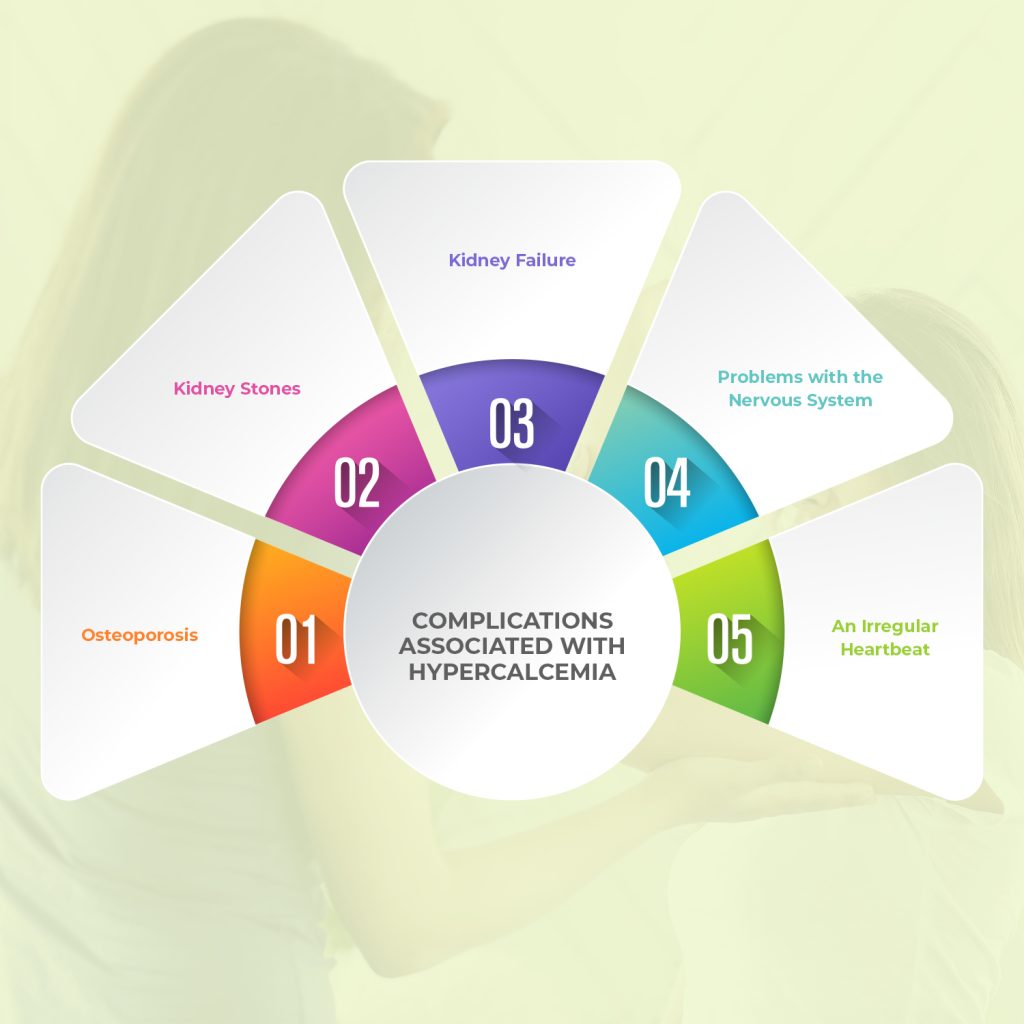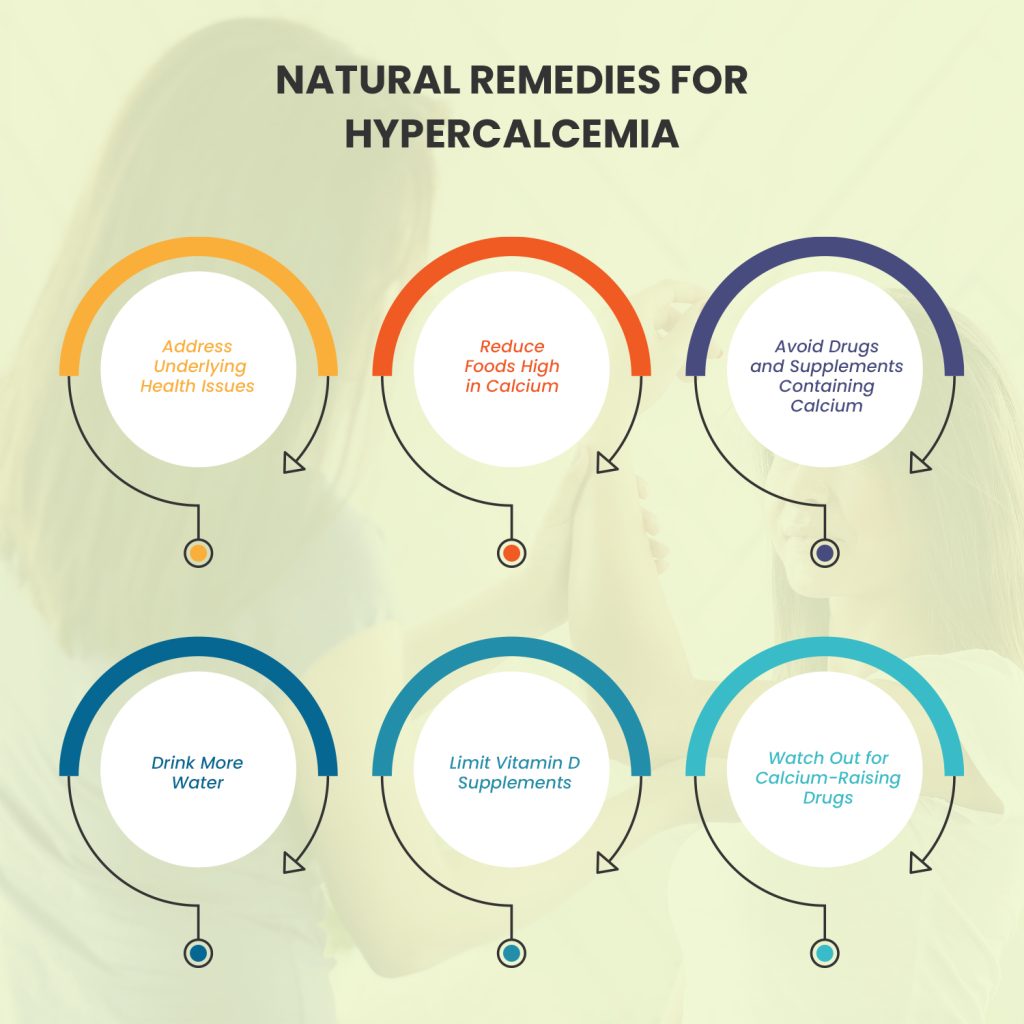


Another name for high calcium levels is hypercalcemia, which refers to having too much calcium in the blood. In the case of some people, the cause of high calcium levels is an overactive parathyroid gland, too much vitamin D, certain medications, or underlying health conditions, such as cancer. Calcium is a pretty essential element for the body. It helps develop strong teeth and bones while also supporting the heart, nerves, and muscles. However, excess calcium can result in many health problems and natural remedies for high calcium levels might be the eventual solution. In this post, I will explain the:
Table of Contents
What is Hypercalcemia?
The parathyroid glands mainly control the calcium levels in the blood. These four small glands sit behind the thyroid.
When the body is in severe need of calcium, the parathyroid glands secrete a particular hormone. This hormone signals:
- the kidneys to activate vitamin D, which assists the digestive tract in absorbing more calcium
- the kidneys to release less calcium into the urine
- the bones to secrete calcium into the blood
An underlying health condition or overactive thyroid glands can disrupt calcium balance. If the calcium level in the blood becomes too high, the doctor may diagnose a person with hypercalcemia. This condition can disrupt bodily functions, and it may be specifically associated with:
- abnormal brain and heart function
- poor bone health
- kidney stones
When the high levels of calcium in the blood become extreme, it can be life-threatening. It would help if you avoided this by making use of natural remedies for high calcium levels.
Symptoms of Hypercalcemia
Mild hypercalcemia may not reveal any symptoms, but more severe hypercalcemia can result in:
- Frequent urination and excessive thirst. Having too much calcium in the body will make the kidneys work harder. Because of this, a person may often urinate, leading to increased thirst and dehydration.
- Digestive problems and stomach pain. Excessive calcium can result in stomach upset, constipation, vomiting, nausea, and abdominal pain.
- Muscle weakness and bone pain. Hypercalcemia can make the bones release too much calcium, leaving them deficient. The irregular bone activity can result in muscle weakness and pain.
- Fatigue, lethargy, and confusion. Excessive calcium in the blood can negatively affect the brain, causing these three symptoms.
- Depression and anxiety. Hypercalcemia can also affect a person’s mental health.
- Abnormal heart rhythms and high blood pressure. Hypercalcemia can increase blood pressure and result in electrical abnormalities that alter the heart’s rhythms, adding strain.
Causes of High Calcium Levels
Underlying medical conditions and several other factors can cause high calcium levels. These factors include:
1. Overactive Parathyroid Glands
The parathyroid glands control calcium levels. If these glands work too hard, the result can lead to hypercalcemia. In addition, the parathyroid glands may become overactive when a noncancerous growth forms on one or when there is an enlargement in one.
An overactive parathyroid gland is called hyperparathyroidism, which may be the most common cause of high calcium levels. Hyperthyroidism often affects people between 50 and 60 years old. Women are three times more susceptible to hyperthyroidism than men.
2. Too Much Vitamin D
Vitamin D triggers the absorption of calcium in the gut. Once absorbed, calcium travels into the bloodstream. The body only absorbs about 10 to 20 percent of the calcium in the diet, while the rest goes to the stools. However, too much vitamin D can make the body absorb more calcium, leading to high calcium levels.
In 2012, a group of researchers suggested that therapeutic high-dose vitamin D supplementation can result in hypercalcemia. These supplements are often for the treatment of multiple sclerosis and other medical conditions. The Food and Nutrition Board in the US describes high doses of vitamin D as over 4,000 international units (IU) each day. The standard recommended daily dose for adults is 600 to 800 IU per day.
3. Cancer
A person with cancer has a high chance of having high calcium levels. Cancers that commonly lead to hypercalcemia include:
- blood cancer
- breast cancer
- lung cancer
In 2013, estimation showed that high calcium levels affect over 2 percent of all cancer patients in the US each year. In addition, about 30 percent of people living with cancer will have hypercalcemia throughout the disease. If cancer spreads to the bone, the risk of having high calcium levels becomes elevated.
Other Health Conditions
Beyond cancer, the following conditions can also lead to hypercalcemia:
- severe fungal infection
- adrenal gland disease
- chronic kidney disease
- thyroid disease
- sarcoidosis
- tuberculosis
4. Reduced Mobility
Those unable to move around for a long time may also be at risk of having high calcium levels. When the bones are inactive for a long time, they can weaken and release more calcium into the bloodstream.
5. Severe Dehydration
People who do not have enough water in their bodies become severely dehydrated, which means their blood contains less water, increasing calcium concentration in the bloodstream. However, this issue can be corrected as soon as a person becomes sufficiently hydrated.
In some rare cases, high levels of calcium can result in severe hydration. The doctor will have to identify which came first: dehydration or the high levels of calcium.
6. Medications
Some medications can overstimulate the parathyroid gland, and this can result in hypercalcemia. An example of these types of drugs is lithium, which people sometimes use in treating bipolar disorder.
Complications Associated with High Calcium Levels

If there is no proper treatment for it, hypercalcemia can result in:
Osteoporosis
Over time, the bones may begin to release excessive amounts of calcium into the bloodstream. This causes the bones to become thinner or even less dense. As the bone continues to release calcium, osteoporosis can occur.
People with osteoporosis are at risk of:
- becoming shorter over time
- a curvature of the spine
- prolonged mobility
- loss of independence
- significant disability
- bone fractures
Kidney Stones
Those with high calcium levels are at risk of developing calcium crystals in their kidneys, usually pretty painful. The condition can also result in kidney damage.
Kidney Failure
Over time, severe high calcium levels can stop a person’s kidneys from functioning properly. As a result, the kidneys may become less effective at producing urine, efficiently removing fluid from the body, or cleaning the blood. This is what we call kidney failure.
Problems with the Nervous System
If untreated for a long time, severe hypercalcemia can disrupt the proper functions of the nervous system. Possible effects include:
- a coma
- weakness
- tiredness
- dementia
- confusion
An Irregular Heartbeat
The heart beats when electrical impulses pass through it and make it contract. Calcium plays a significant role in regulating this process. Therefore, too much calcium can cause the heart to beat irregularly.
6 Natural Remedies for High Calcium Levels

There are various safe things you can do to decrease your blood calcium levels and avoid having hypercalcemia. Consider the following natural remedies for high calcium levels:
1. Address Underlying Health Issues
If your hypercalcemia is mild and you are already working with your doctor to address the causes, the following strategies may help. However, it would help if you first discussed these strategies with your doctor.
When you have high calcium levels, your doctor may prescribe the following:
- Intravenous fluids
- Dialysis (if other treatments are not helping, or if there is damaged kidneys)
- Calcitonin, biphosphonates, loop diuretics, or corticosteroids
It would help if you did not make any sudden changes to your lifestyle, diet, or supplement regimen without consulting your doctor.
2. Reduce Foods High in Calcium
If you know you are suffering from high calcium levels, you may have to reduce your intake of food high in calcium. Such foods include green leafy vegetables, fortified cereals, tofu, and dairy. Instead, increase your intake of low-calcium foods. Some healthy low-calcium foods include asparagus, strawberries, eggplant, tomatoes, apples, rice, meat, resistant starch, and olive oil.
3. Avoid Drugs and Supplements Containing Calcium
You should avoid taking calcium supplements if you have hypercalcemia. Many dietary supplements contain calcium, so you should be very careful about your choice of supplement; these supplements include over-the-counter drugs for acid reflux (for example, Tums) and multivitamins.
4. Drink More Water
You need to consume more water if you are suffering from hypercalcemia. Staying hydrated will help flush more calcium from the body through the urine. Hydration (saline drop) is one of the principal treatments for hypercalcemia in hospitals.
5. Limit Vitamin D Supplements
Vitamin D elevates the amount of calcium your body takes in. If your calcium levels are already too elevated, you do not need to worsen them by increasing calcium absorption from foods. You may need to decrease your dosage of vitamin D or generally stop supplementing it. Importantly, exposure to the sun does not cause dangerously high vitamin D levels. Even if you expose yourself to too much sun, sunlight will degrade any excess vitamin D. limiting your vitamin D supplement is one of the essential natural remedies for high calcium levels.
6. Watch Out for Calcium-Raising Drugs
Some medications may increase your calcium blood levels. Talk to your doctor if your calcium levels are high, and you are taking any of the following medications:
- Antacids for heartburn (for instance, Tums)
- Tamoxifen (Nolvadex), used to fight breast cancer
- Anti-estrogens, used in the treatment of hormonal abnormalities and breast cancer
- Estrogens, such as birth control pills
- Androgens used majorly in breast cancer therapy
- Thiazide diuretics
If your calcium levels are too low and you are looking to increase them, then you should consider the following options:
Addressing Underlying Health Issues
Low blood calcium (or hypocalcemia) is often a result of underlying health conditions, such as vitamin D deficiency or underactive thyroid gland (hypoparathyroidism). The most important first thing to do in this case is to work with your doctor in discovering what’s causing your low calcium levels and how to treat any underlying conditions.
Vitamin D
If your body lacks enough vitamin D because of a lack of sun or insufficient dietary intake, there may be a drop in your calcium levels. This is because vitamin D helps absorb calcium in the stomach. If you cannot get sufficient vitamins from the sun, then discuss the right vitamin D supplements with your doctor.
Eat Foods High in Calcium
You may have a low calcium level because you are not getting enough of the nutrient in your diet. Always ensure that your diet is well-balanced and healthy and contains enough of all the essential nutrients, such as calcium. The most significant sources of calcium are dairy products, including cheese, yogurt, and milk.
Plant-Based Diets
If you follow a vegan diet, you are exposing yourself to the risk of getting an insufficient amount of certain essential nutrients, including vitamin D and calcium. Choose vegetables low in oxalic acid but high in calcium. Excellent sources of calcium include:
- Kidney beans
- Nuts (almonds, walnuts, hazelnuts)
- Kale, broccoli, collard greens, bok choy, cauliflower, sprouts
- Tofu
Dairy-free Diets
If you follow a carnivore or paleo-style diet, you probably avoid nuts, soy, and dairy. Good sources of calcium for people on meat-heavy diets include:
- Beef tripe
- Fresh or canned fish with bones
Quit Smoking
Smoking significantly reduces parathyroid hormone and vitamin D. You absorb less and shed more calcium from your body. Smoking also elevates bone loss and is a risk factor for osteoporosis.
Reduce the Intake of Alcohol
Consuming alcohol decreases the absorption of calcium and increases the loss of it through urine. Excessive alcohol drinking also impedes vitamin production, reduces sex hormone levels (estrogen in women and testosterone in men), and weakens the bones.
Avoid Foods that Bind Calcium
If your body is not getting sufficient calcium, ensure that you are not predominantly taking foods that decrease calcium absorption, such as beets, rhubarb, potatoes, and spinach. Instead, reduce your intake of such foods.
Foods that are High in Calcium
Below is a list of calcium-rich foods. You can eat these foods when you need more calcium in your body. However, if your calcium levels are too high, you must avoid them and instead consider the natural remedies for high calcium levels:
| Food | Serving Size | Calcium (mg) |
| Brazil nuts | 1 oz | 50 |
| Brussels sprouts | 1 cup cooked | 60 |
| Broccoli | 1 cup cooked | 60 |
| Almonds | 1 oz | 80 |
| Orange | 1 medium size | 80 |
| Kale | 1 cup chopped | 100 |
| Chia seeds | 1 oz | 200 |
| Spinach | 1 cup cooked | 240 |
| Salmon | 3.5 oz with bones | 240 |
| Sardines | 3.5 oz with bones | 250 |
| Yogurt | 6 oz | 300 |
Final Thoughts
A person’s outlook generally depends on the severity and cause of high calcium levels. If you are experiencing the symptoms of hypercalcemia, then you should speak with your doctor immediately. Do not attempt using any of the natural remedies for high calcium levels without first consulting your doctor.
Post Disclaimer
The information contained in this post "Hypercalcaemia: 6 Natural Remedies for High Calcium Levels" is for educational purposes only. Always consult your primary care doctor before using the remedies that are provided. The information is provided by The Hidden Cures and while we do timely, in-depth research on the information that we provide to you, everything stated may not be up to date or accurate from the time it was written.



